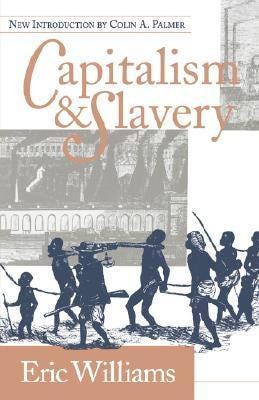⭐️⭐️⭐️⭐️ of 5 stars
When I visited the US Virgin Islands, I was captivated by the charm of the islands. Hiking trails leading to sugar mills are scattered across the landscape. The photo I took below is an example of this.
Before reading Capitalism & Slavery, I knew little about the history of the Atlantic slave trade and its connections to the sugar mills in the Caribbean. The book clarified many commonly known facts, but as I delved deeper, it also raised more questions.
Some of the topics covered in the book that piqued my interest—though not its main focus—include:
1. Why does Canada still have such strong historical ties to the British?
During “the Seven Years' War”, Britain and France clashed over control of their Caribbean colonies. As a result of the war, France ceded Canada to Britain.
2. Why are there so many sugar mill ruins in the Caribbean islands?
These ruins are more than just picturesque attractions on hiking trails. They represent the once-thriving sugar industry, which was a cornerstone of the slave-based economy in the region.
3. British West Indian (BWI) is ended since it's not profitable for slave owners; is it true?
Slavery became economically unsustainable for the British capitalist class, primarily due to financial reasons rather than humanitarian ones. Coming from an Eastern country, I didn’t learn much about this history until my early twenties. The role of capitalism and the decline of profitability in slavery-related industries played a significant role in ending slavery.
After pondering these questions, I moved on to the core of the book. Capitalism & Slavery focuses on how slavery contributed to the rise of capitalism, and how, in turn, the development of capitalism led to the dismantling of slavery.
The book is rich in references and sources that trace the origins, growth, decline, and eventual abolition of the slave trade in the West Indies, specifically in British colonies. Its dense use of quotations can sometimes make the reading experience more distracting, but it offers a detailed, comprehensive view of the slave trade. It explores the monopoly and trade relationships between British planters (slave owners in the Leeward Islands and the Caribbean) and other colonies, such as North America, French colonies, Canada, Brazil, Jamaica, Cuba, and India. Understanding these trading networks is key to grasping why and how slavery in the BWI began, expanded, and was abolished earlier than in other colonies.
The significance of capitalism and the Industrial Revolution in abolishing slavery, as well as the role slavery played in laying the foundation for capitalist development, are major themes of the book. Some noteworthy theories discussed include the stages of slavery in the British West Indies, which can be divided into three phases: initiation, development, and abolition.
The initiation of slavery:
Slavery was driven by economic demands rather than racial superiority or moral reasons.
The development of slavery:
Mercantilism played a key role in the growth of slavery. Planters and merchants collaborated to strengthen monopolies and limit free trade.
Mercantilism favored the British West Indies at the expense of the North American colonies. The rising trade costs for the North American colonies, a result of the BWI monopoly, helped push them towards rebellion and, ultimately, independence.
The abolition of slavery:
Slavery ended because it became economically unviable. The development of British capitalism reshaped the political landscape in the 1830s, enabling an attack on monopolies in general, and the West Indian monopoly in particular. The attack on the West Indies was more about breaking monopolies than ending slavery, which had become unprofitable by then.
What I like from this book:
The book has provided a wealth of material and resources to support its concepts. Even as a book written over 80 years ago, the points are still astounding.
What I disagree with the book:
In chapter 13, the author mentioned,
"The political and moral ideas of the age are to be examined in the very closest relation to the economic development. Politics and morals in the abstract make no sense.”
I disagree, In my opinion, the author overestimates the role of slaves' own force in the abortion of slavery. What I do agree with is that the defense or attack on slavery is not always on a high moral or political level, with British statesmen and publicists changing the tune based on their own contemporary interests. They support slavery one day, abuse it the next, and then defend it again. What makes sense is more complicated than “politics and morals make no sense”.
Even still, these are small disagreements with the author. I enjoyed the book the best since it was so rich in research information and references. In a day full of cheap arguments and racist accusations on social media. Reading this book is a better and more worthy way to spend your time.
Thank you for reading!
Goodreads Link: https://www.goodreads.com/book/show/178651
Read my other book notes:
03 Book Notes - How China Works: An Introduction to China’s State-led Economic Development
04 Book Notes - Parable of the Sower
Subscribe to my blog for free to see more of my reviews:
Share to your friend if you like my blog:
Your thoughts on this would be greatly appreciated




